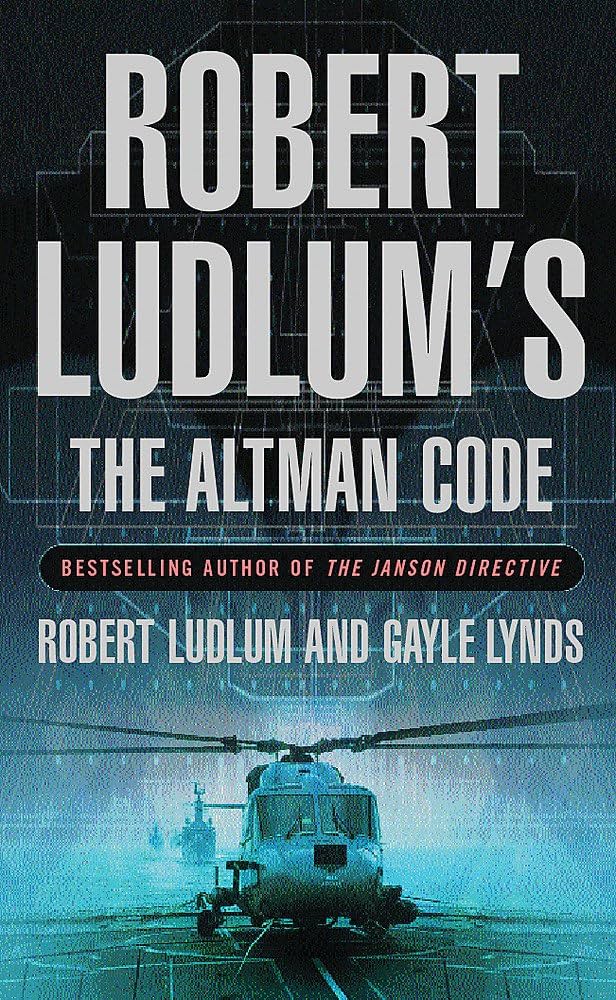(The Covert-One novels / Robert Ludlum)
New York Times Bestselling Series For three decades, Robert Ludlum’s bestselling novels have set the standard in almost every country in the world against which all other novels of international intrigue are measured. Now comes the latest volume in the series of novels featuring Robert Ludlum’s Covert-One In the middle of the night, on the dark waterside docks of Shanghai, a photographer is recording cargo being secretly loaded when he’s brutally killed and his camera destroyed. Shortly thereafter Covert-One director Fred Klein brings the word to the President that there’s a Chinese cargo ship rumored to be carrying tons of chemicals to be used by a rogue nation to create new biological weapons. The President cannot let the ship land and risk the consequences of a new stockpile of deadly chemical weapons. Klein is ordered to get the President solid proof of what the Chinese ship is ferrying. Covert-One agent Jon Smith is sent to rendezvous in Taiwan with another agent who has acquired the ship’s true manifest. But before Smith can get the document, the two agents are ambushed, the second agent is murdered, the proof is destroyed, and Smith escapes with only his life, scant clues to mystery behind the cargo ship, and a verbal message---the President’s biological father is still alive, held prisoner by the Chinese for fifty years. As the Chinese cargo ship draws ever closer to its end port, Smith must race against the clock to uncover the truth about the ship and its cargo, a truth that probes the deepest secrets of the Chinese ruling party, the faction in Washington working to undermine the elected government, and the international cabal who is thrusting the world to the very brink of war. [loc.gov]
Friday, September 1, 2002 Shanghai, China On the north bank of the Huangpu River, giant floodlights glared down on the docks, turning night into day. Swarms of stevedores unloaded trucks and positioned long steel containers for the cranes. Amid the squeals and rasps of metal rubbing metal, the towering cranes lifted the containers high against the starry sky and lowered them into the holds of freighters from across the world. Hundreds streamed in daily to this vital port on China's eastern coast, almost midway between the capital, Beijing, and its latest acquisition, Hong Kong. To the south of the docks, the lights of the city and the towering Pudong New District glowed, while out on the swirling brown water of the river itself, freighters, junks, tiny sampans, and long trains of unpainted wood barges jostled for position from shore to shore, like traffic on a busy Paris boulevard. At a wharf near the eastern end of the docks, not far from where the Huangpu curved sharply north, the light was less bright. Here a single freighter was being loaded by one crane and no more than twenty stevedores. The name lettered on the freighter's transom was The Dowager Empress; her home port was Hong Kong. There was no sign of the ubiquitous uniformed dock guards. Two large trucks had been backed up to her. Sweating stevedores unloaded steel barrels, rolled them across the planks, and set them upright on a cargo net. When the net was full, the crane arm swung over it, and the cable descended. On its end was a steel hook that caught the light and glinted. The stevedores latched the big net to the hook, and the crane swiftly lifted the barrels, wheeled them around, and lowered them to the freighter, where deckhands guided the cargo down into the open hold. The truck drivers, stevedores, crane operator, and deckhands worked steadily on this distant dock, fast and silent, but not fast enough for the large man who stood to the right of the trucks. His sweeping gaze kept watch from land to river. Unusually pale-skinned for a Han Chinese, his hair was even more unusual--light red, shot with white. He looked at his watch. His whispery voice was barely audible as he spoke to the foreman of the stevedores: ``You will finish in thirty-six minutes.'' It was no question. The foreman's head jerked around as if he had been attacked. He stared only a moment, dropped his gaze, and rushed away, bellowing at his men. The pace of work increased. As the foreman continued to drive them to greater speed, the man he feared remained a looming presence. At the same time, a slender Chinese, wearing Reeboks and a black Mao jacket over a pair of Western jeans, slid behind the heavy coils of a hawser in a murky recess of the loading area. Motionless, almost invisible in the gloom, he studied the barrels as they rolled to the cargo net and were hoisted aboard The Dowager Empress. He removed a small, highly sophisticated camera from inside his Mao jacket and photographed everything and everyone until the final barrel had been lowered into the hold and the only remaining truck was about to be driven away. Turning silently, he hid the camera inside his jacket and crab-walked away from the brilliant lights until he was wrapped again in darkness. He arose and padded across the wood planks from storage box to shed, seeking whatever protection he could find as he headed back toward the road that would return him to the city. A warm night wind whistled above his head, carrying the heavy scent of the muddy river. He did not notice. He was exultant because he would be returning with important information. He was also nervous. These people were not to be taken lightly. By the time he heard footsteps, he was nearing the end of the wharf, where it met the land. Almost safe. The large man with the unusual red-and-white hair had been quietly closing in, taking a parallel path among the various supply and work sheds. Calm and deliberate, he saw his target tense, pause, and suddenly hurry. The man glanced quickly around. To his left was the lost part of the dock, where storage and seagulls found their haven, while on the right was a pathway kept open for trucks and other vehicles to go back and forth to the loading areas. The last truck was behind him, heading this way, toward land. Its headlights were funnels in the night. It would pass soon. As his prey darted behind a tall pile of ropes on the far left, the man pulled out his garotte and sprinted. Before the fellow could turn, the man dropped the thin cord around his neck, yanked, and tightened. For a long minute, the victim's hands clawed at the cord as it tightened. His shoulders twisted in agony. His body thrashed. At last, his arms fell limp and his head lolled forward. As the truck passed on the right, the wood dock shuddered. Hidden behind the mountain of ropes, the killer lowered the corpse to the planks. He released the garotte and searched the dead man's clothes until he found the camera. Without hurrying, he walked back and retrieved two of the enormous cargo hooks. He knelt by the corpse, used the knife from the holster on his calf to slash open the belly, buried the points of the iron hooks inside, and sealed them there by winding rope around the man's middle. With alternating feet, he rolled him off into the dark water. The body made a quiet splash and sank. Now it would not float up. He walked toward the last truck, which had paused as ordered, waiting, and climbed aboard. As the truck sped away toward the city, The Dowager Empress hauled up her gangway and let go her lines. A tug towed her out into the Huangpu, where she turned downriver for the short journey to the Yangtze and, finally, the open sea. [loc.gov]
1 placówka posiada w zbiorach tę pozycję. Rozwiń informację, by zobaczyć szczegóły.




